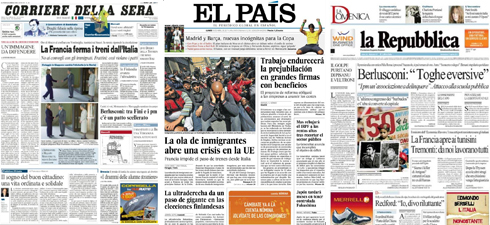“France blocks trains from Italy,” writes Corriere della Sera. On April 17 French authorities, citing risks of disturbances to public order, refused to allow trains to cross the border at Ventimiglia, sparking protests on the tracks by Tunisian migrants who were planning to take a “train of dignity” together with Italian and French activists. By Sunday evening the border had re-opened to rail traffic, but only after Rome lodged a formal protest with Paris. Paris then allowed the migrants to enter, while challenging the validity of the temporary visas issued by the Italian authorities.
Behind this “miserable” diplomatic clash lies the “struggle of populist twins”, writes Bernardo Valli in La Repubblica. “In Rome, the government relies on a xenophobic party [Northern League], which holds the Interior Ministry,” while in France, Nicolas Sarkozy's re-election in 2012 is being challenged by the increasing appeal of the National Front to his voters. As a result, Rome and Paris are “playing with migrants as if they were a natural calamity like a tsunami, as if they were mere objects that could cost them votes.”
EU is clearly not going through brightest period of its history
The other victim of this quarrel is the principle of free movement within the EU. “Goodbye to Schengen?” asks Spain’s El País in an editorial, expressing regret that “France is blocking access to Arab immigrants and violating the agreement on freedom of movement.”
The President of the European Council, Herman Van Rompuy, for his part, the Madrid daily continues, has launched “a bland appeal for calm, requesting that the magnitude of the crisis not be exaggerated.” But, El País notes, “in reality he is mistaken about the real crisis. As difficult as it is to manage the immigration issue in the face of a public opinion – particularly in the south of Europe – that is increasingly opposed to letting in more ‘visitors’ in times of economic difficulty, the truly grave issue here is that France is giving itself carte blanche to do what it likes and is violating the agreements it has committed itself to, like the Schengen Convention”.
“The EU is clearly not going through the brightest period of its history, as evidenced by its inane and purely rhetorical response to the democratic uprisings in the Arab world,” El País concludes. This is “creating state policies that are purely bilateral, which runs contrary to the integration of Europe… If Schengen falls, one will have to wonder if there is any reason for the existence of the Union of Twenty-Seven”.
Was this article useful? If so we are delighted!
It is freely available because we believe that the right to free and independent information is essential for democracy. But this right is not guaranteed forever, and independence comes at a cost. We need your support in order to continue publishing independent, multilingual news for all Europeans.
Discover our subscription offers and their exclusive benefits and become a member of our community now!












